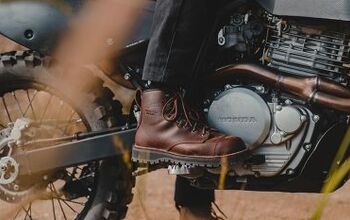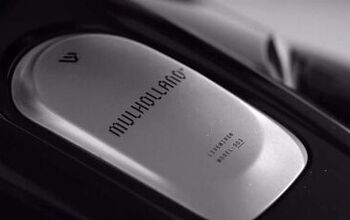Skidmarks - Donorcycles
“Motorcycle fatalities are not only our No. 1 source of organs, they are also the highest-quality source of organs, because donors are usually young, healthy people with no other traumatic injuries to the body, except to the head… [a mandatory motorcycle helmet law] could put us out of business – or at least the business of organ transplants.”
—Transplant surgeon quoted in “Brain Dead: Why Are There No Mandatory Helmet Laws?” by Jerry Garrett, New York Times online, July 7, 2008.
Donorcycle. You’ve overheard that ugly term, maybe while standing in line at the bank, helmet in hand. The presumption is that riding a motorcycle makes us suicidal and good for nothing but a source of freshly harvested organs. But unlike most stereotypes, this one actually has some legs – one study showed that helmet laws reduce the number of available organs 10% – which means we motorcyclists provide a sad but useful function to society. Motorcyclists are generous folk, so it’s not surprising that we’re pretty good at checking that box that identifies us an organ donor, resulting in thousands of lives saved every year. If only all Americans were so generous.
I’m writing this because my buddy Bob needs a kidney. Bob is an awesome guy. Everybody knows a Bob, which is why, I suppose, it’s such a common moniker. Bob (and I mean pretty much all Bobs, not just my Bob, who isn’t even actually named Bob) will invite a perfect stranger into his house and then machine him a part in his basement workshop. Bob will open up his wallet and give a five to a homeless guy, just because he asked nicely. Bob will say “yes,” just because I think he actually lacks the mental infrastructure to say “no,” no matter how many times he’s taken advantage of.
Bob has polycystic kidney disease (PKD) and is currently on dialysis. He’s been on the donor list for a while now, and has had a few different donors offer and then back out, for whatever reason. So, Bob really deserves a kidney. I’d give him one of mine, but I have a medical condition that precludes me from donation, as does his lovely wife. I don’t think the issue I have makes my kidney unsuitable (or dangerous to donate), but the organ-donation laws here in the U.S.A. are weighted (maybe too heavily) to prevent that feeling of regret that occurs when you wake up in a hospital room lighter by one kidney.
The hurdles are very effective. There are about 120,000 folks waiting for organs, and somebody is added to the recipient list for all organs every 10 minutes or so, according to the U.S. Government’s organ-donation information website, but there are only about 15,000 donations, live and deceased, annually. Even though it’s an easy thing to do, most Americans aren’t registered organ and tissue donors. In fact, even though more than 90% of Americans 18 and over have state-issued ID – either an ID card or drivers license – less than half of them are registered organ and tissue donors. Why wouldn’t you be a donor? Well, some people really do have legitimate reasons – religious objections, medical or other factors that make all their tissue and organs unsuitable, but that would constitute a small percentage of Americans.
Here are some other possible reasons:
I’m scared you’ll farm my organs.
No, despite what you saw in Monty Python’s Meaning of Life, or what your friend Liz swears happened to her ex-boyfriend’s sister’s piano teacher’s rabbi, you will not wake up in a dirty Hong Kong hotel room bathtub with fresh incisions from where the nice people you met at a karaoke lounge in Weehawken, New Jersey took out your kidney. That has never happened. The Chinese government may or may not be harvesting organs from political prisoners, but otherwise pretty much all organ donations are above board, especially here in the U.S.A., where it’s illegal to sell organs or body parts.
They’ll declare me dead too soon because they’ll be in such a hurry to get at my organs.
This is also mostly urban legend, though it has happened. However, because of very strict legal and ethical guidelines, you’re more likely to be mistakenly declared dead by a regular doctor than by a transplant surgeon. There is an argument to be made for not registering as an organ and tissue donor, though – your family can insist on more stringent tests to be sure you are really dead before any transplant procedures start. But that can also reduce the chance of a successful procedure.
I’m old, tough, and I love cheap tequila. They don’t want my organs.
Just because you don’t appreciate your liver doesn’t mean nobody else will. There is no upper age limit for organ donation. In fact, 32% of donors are over 50, and a 92-year-old dude from Texas named Carlton Blackburn became the nation’s oldest liver donor when he died from a brain hemorrhage. His aged-to-perfection organ was transplanted into a 69-year-old woman, saving her life (no, I don’t know if she’s still alive).
I want an open-casket funeral.
Not to worry–you won’t be butchered in the local Piggly-Wiggly meat department. Thanks to the art of surgeons and morticians, you’ll probably look better than you do now, going by what I’ve seen of our readers in person. Even Orthodox Jews, who believe it’s a desecration to alter, disfigure or otherwise damage a corpse, will waive that restriction to save lives.
I don’t have time to register.
And yet you had time to read my column? You need help. Meanwhile, I’ve got the links for most of you:
California
Texas
Florida
National
Gabe Ets-Hokin is a gourmet chef and psychotherapist. He is currently shopping for some fava beans and a nice Chianti. If you do want to save Bob’s life and give him your kidney, email Gabe at getshokin@gmail.com. It will make up for all the bad things you did in your life, including buying a Suzuki Madura and taking your wife to see Biker Boyz.
More by Gabe Ets-Hokin


































Comments
Join the conversation
Good stuff, Gabe. My uncle died in his 40s waiting for a liver donor. Even before then, though, I've always been a registered donor. I mean, what am I going to want all these bits for when I'm dead? Same thing with my stereo and shoes –– someone else can have them, too.
I disagree with the cartoon. EVERYONE should wear a helmet, but NOBODY should support helmet laws. Making a law to save lives ends where? Think how many lives you could save by outlawing motorcycles altogether. Legislating safety is a losing proposition. We will all eventually lose.